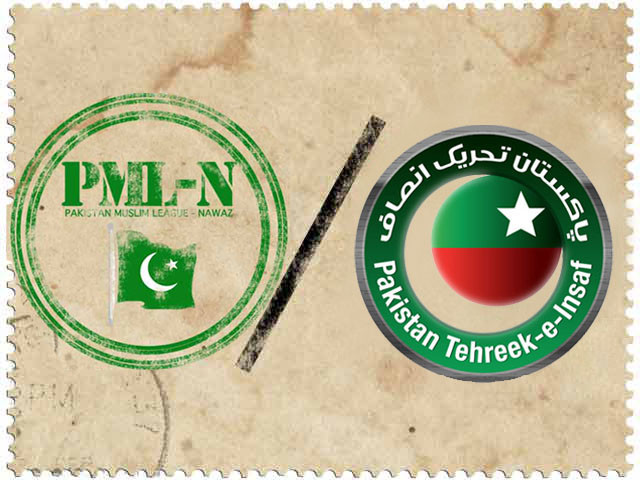PTI, PML-N lock horns over economic policies
Debate at local business school highlights best steps going forward.

A debate on energy issues took up most of the two and a half hours dedicated to the discussion.
One such debate, titled ‘Pakistan’s Future Economic Outlook and Model Economic Policy’, was organised here at the Institute of Business Administration (IBA), Karachi – one of Pakistan’s premier business schools.
Asad Umer, former CEO of Engro Corporation and current senior vice president of PTI, was pitted against Dr Miftah Ismail, director of Ismail Industries and former VC and head of the Punjab Board of Investment and Trade, who has been affiliated with the PML-N.

Organisers had envisioned a debate purely on economic policies, but the discussion was bound to touch on the core policies of the PML-N and PTI, as both speakers used their parties’ names in presentations.
Other expert panellists who took part in the discussion included former State Bank governor Salim Raza and State Bank’s Chief Economic Advisor Dr Mushtaq Khan.
Solutions to the energy crisis
A debate on energy issues took up most of the two and a half hours dedicated to the discussion. Umer – who was extremely popular among the students as an IBA alum – said that almost each and every aspect of Pakistan’s economy is linked with the energy crisis, so its solution will remain on top of PTI’s economic agenda.
“The energy sector is one of the most mismanaged sectors in Pakistan,” Umer said. “With abundant energy resources – both conventional and unconventional – the biggest export of Pakistan to India should have been energy.”
“Pakistan should have established a 5,000 megawatt lignite [coal] plant in Karachi,” said Dr Ismail, while listing down the priorities of the next government. “That plant should initially be run on imported coal, and then switched to Thar Coal.”
Both speakers stressed on the need for increasing the share of coal in the energy mix, and said that any new government would have to introduce immediate reforms in the energy sector
Tax on agricultural income
On increasing the tax net, Umer said Pakistan cannot increase the tax-to-GDP-ratio unless it taxes the rich, and especially the agricultural sector. “Unless you slap taxes on the agricultural sector and the rural rich, you can never succeed in taxing the urban elite in Pakistan,” Umer said. “Both should go hand in hand.”
“If our party comes to power, we will surely tax the agriculture sector at all costs,” he added.
Participants stressed upon the fact that provincial assemblies have been reluctant to tax agricultural incomes, while the federal government has hidden behind the 18th Amendment, saying that this is now a provincial matter.
State-run enterprises
On public sector enterprises, Umer was of the opinion that one cannot solve their problems by just laying off surplus employees. “Instead of laying off additional staff, you first need to introduce basic reforms in,” said Umer. “Inefficiency is a bigger killer than the financial burden of extra salaries in all such organisations,” he observed.
Mass transit systems or investment in other projects?
Although the PTI has officially assured the nation that it will continue pursuing projects like the Lahore Mass Transit System, Umer said his party would invest in projects that provide greater economic returns to the economy.
“Rather than focus on mass transit systems, we will invest in energy projects that produce employment opportunities,” said Umer.
Ismail, on the other hand, defended the Lahore Mass Transit System and said that the first thing the PML-N government would do is to build a similar one for Karachi.
Published in The Express Tribune, March 27th, 2013.
Like Business on Facebook to stay informed and join in the conversation.


















COMMENTS
Comments are moderated and generally will be posted if they are on-topic and not abusive.
For more information, please see our Comments FAQ